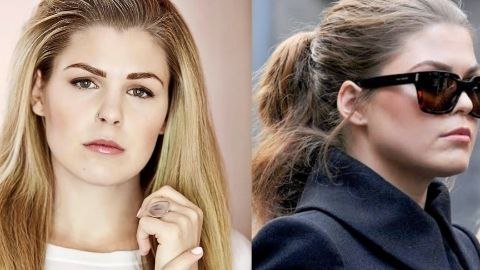Table of Contents
Introduction to Belle Gibson
Belle Gibson, a young Australian entrepreneur and wellness blogger, gained notoriety for her controversial claims regarding her health journey. In her early twenties, Gibson asserted that she had been diagnosed with terminal cancer and had successfully overcome it through a regimen of natural healing practices, including the consumption of apple cider vinegar. Her story resonated with countless individuals, leading her to amass a significant social media following and establish her brand in the wellness community.
In 2014, Gibson launched her app, “The Whole Pantry,” which focused on healthy recipes and lifestyle choices, further cementing her status as a prominent wellness guru. The app garnered significant praise and quickly climbed the charts on various platforms, effectively reaching a wide range of consumers interested in natural health alternatives. Additionally, her cookbook, which showcased many of the recipes featured in the app, became a commercial success, consolidating her influence in the wellness industry.
However, as Belle Gibson’s fame continued to grow, so too did scrutiny surrounding the authenticity of her claims. As questions began to arise regarding her cancer diagnosis and treatment, it paved the way for a significant controversy that would unravel her carefully curated persona. The initial impression of Gibson as a courageous survivor would soon give way to revelations that challenged the very foundation of her narrative.
The Claim of Cancer and Natural Healing
The story of Belle Gibson is one that has resonated deeply within the wellness community, primarily due to her claims surrounding a cancer diagnosis. Gibson, a self-proclaimed health advocate, asserted that she was diagnosed with malignant brain cancer at a young age. Her narrative centered on a deeply personal journey of battling this illness, claiming that she had turned to diet and alternative healing methods rather than conventional treatments like chemotherapy. This choice, she insisted, led to her remarkable recovery.
However, the authenticity of her claims has been the subject of considerable scrutiny. Critics have pointed out inconsistencies and a lack of verifiable evidence supporting her diagnosis. Despite such concerns, her story highlights the sometimes dangerous impacts of social media in propagating unverified health information. The allure of natural healing and the personal empowerment it offers can easily overshadow the need for evidence-based practices. As her following continued to grow, the implications of her claims raised important conversations regarding the responsibility of influencers in the wellness space and the consequences of misleading health narratives.
The Growth of a Wellness Empire
Belle Gibson’s rise in the wellness industry epitomizes the intersection of personal narrative and strategic marketing. Her story of battling cancer, while controversial, resonated with many individuals seeking hope and alternative health solutions. Leveraging her experiences, Gibson launched ‘The Whole Pantry’ app, a digital platform designed to provide users with healthy recipes, meal plans, and wellness advice. The app quickly gained traction, partly due to its sleek interface and appealing content, emphasizing clean eating and holistic health practices.
The marketing strategies employed by Gibson played a crucial role in her success. Through the effective use of social media, she was able to cultivate a strong online presence, sharing personal testimonials and success stories that aimed to inspire her audience. This technique not only established her credibility as a wellness advocate but also fostered a sense of community among her followers. Additionally, her collaborations with brands and influencers in the health space helped amplify her reach, inviting wider audiences to engage with her content.
Following the app’s popularity, Gibson released a corresponding cookbook, ‘The Whole Pantry: A Cookbook’, which further solidified her status as an authority in the wellness sector. The book was celebrated for its combination of recipes and lifestyle tips, appealing to those who wished to adopt a cleaner, more wholesome way of living. With a strong narrative of triumph over adversity, she was able to attract a dedicated fan base that identified with her personal journey. This effectively showcased how powerful storytelling can be in the realm of health and wellness, ultimately contributing to the expansion of her wellness empire.
The Unraveling of the Truth
The journey towards uncovering the deceptive practices of Belle Gibson began with subtle signs and growing skepticism around her wellness narrative. Initially hailed as a beacon of hope for those battling illness, Gibson’s rapid ascent in the wellness community was marred by inconsistencies in her story. Key indicators began surfacing as early as 2013, when articles emerged questioning the validity of her claims regarding terminal cancer and unconventional treatment methods. Many in the media started scrutinizing her assertions, leading to rumors that complicated her already intricate tale.
As Gibson presented herself as a figure of inspiration, her narrative was further scrutinized by both journalists and the public. Critics noticed discrepancies in her cancer diagnosis timeline, which contradicted medical records. Moreover, her promotional activities linked to Apple Cider Vinegar and other alternative wellness products raised doubts about the sincerity of her intentions. By 2015, the growing chorus of questions reached a crescendo, urging her to substantiate her claims amidst a media landscape that was becoming increasingly skeptical.
The Representation of Gibson’s Story in Apple Cider Vinegar
The Netflix miniseries “Apple Cider Vinegar” presents a nuanced dramatization of Belle Gibson’s story, focusing on the complexities of truth, deception, and the consequences of misleading narratives. The series intertwines factual elements of Gibson’s life with creative reinterpretations, providing viewers with a compelling yet critical lens through which to assess the significance of her actions. The showrunner’s choices in narrative style play a pivotal role in emphasizing the inherent conflicts between authenticity and crafted persona.
One notable aspect of the miniseries is its ability to blend documentary-style interviews with dramatized reenactments. This dual approach not only offers an immersive viewing experience but also encourages the audience to ponder the thin line separating reality from fiction in wellness narratives. By incorporating interviews from experts and individuals connected to Gibson, the series enriches its narrative, showcasing the broader implications of her deceptive claims on community trust and personal health choices. The dramatization serves as a vehicle to address the dangers associated with wellness culture, particularly in the age of social media.
In its exploration of themes surrounding truth and deception, “Apple Cider Vinegar” critiques the societal tendency to idolize wellness gurus without questioning the validity of their claims. The portrayal of Gibson’s rise and subsequent fall serves as a cautionary tale about the potential ramifications of exploiting health narratives for personal gain. The storytelling choices made throughout the series highlight the importance of maintaining a critical approach towards information, especially in matters concerning health and well-being. Consequently, the miniseries prompts viewers to confront their own beliefs and the information they consume.
The Fallout and Public Reaction
The fallout from Belle Gibson’s admissions was swift and fierce, igniting a significant public outcry that reverberated across social media platforms and traditional news channels. Following her revelations about fabricating her cancer journey and deceitfully promoting various health products, many former supporters felt betrayed. This sense of betrayal was exacerbated by the fact that Gibson’s endorsements often involved claims of using remedies like apple cider vinegar as part of a holistic approach to wellness, leading to widespread skepticism about the integrity of health narratives. The outrage was not simply directed at Gibson but rather extended to the larger wellness industry, scrutinizing its authenticity and practices.
Media reactions varied widely, with some outlets condemning Gibson outright for her deceptive practices, while others sought to delve deeper into the implications of her actions on the broader wellness movement. Prominent health journalists and critics began to question the integrity of “influencers” within this space, highlighting the need for transparency and accountability. They emphasized that Gibson’s misleading claims undermined the trust that vulnerable individuals place in wellness narratives when searching for answers to their health challenges.
The scandal spelled critical consequences for Gibson, who faced legal ramifications and financial penalties due to her fraudulent actions. This event also instigated a cultural reflection among consumers regarding their perception of authenticity and vulnerability in health discourse. Viewers began to reevaluate the narratives presented to them, becoming more discerning about the information they consume. Ultimately, Gibson’s story serves as a cautionary tale that invites consumers to seek evidence-based practices and prioritize transparency when navigating the often murky waters of health and wellness advice.
The Impact of Social Media on Health Narratives
Social media has fundamentally altered the way health narratives are communicated and disseminated, markedly facilitating the rapid spread of information — both accurate and inaccurate. The case of Belle Gibson is a pertinent example of how platforms like Instagram, Facebook, and Twitter enabled a wellness guru to build a significant following by presenting unverified health claims and products. Through savvy marketing strategies, Gibson’s tale of overcoming cancer with natural remedies captured the attention of users seeking alternative health solutions, which ultimately propelled her influence in wellness circles.
Central to this phenomenon is the rise of influencer culture, where individuals with large online followings can sway public opinion and consumer behavior, frequently without the necessary qualifications or scientific backing. This has raised concerns among health professionals about the potential risks associated with following unverified narratives offered by so-called wellness influencers. Gibson, in particular, exemplified this trend, illustrating how easily misinformation can be propagated in the health domain. Many of her followers, enticed by her compelling story, began to purchase products endorsed by her, contributing to the normalization of pseudoscience in wellness culture.
The convenience and accessibility of social media create a double-edged sword; while they foster community and provide platforms for diverse voices, they also expose users to misinformation that can have serious health implications. This trend becomes particularly troubling when individuals, desperate for solutions to their health issues, place their trust in unqualified sources. Social media platforms must take greater responsibility in managing the spread of misleading health claims, as users often lack the expertise to discern reliable information from potentially harmful content. In light of such dangers, it is crucial for users to approach health narratives shared online with a critical eye and to seek information from credible sources.
Comparisons to Other Scams and Deceptive Figures
The narrative surrounding Belle Gibson echoes the stories of other high-profile scammers like Anna Sorokin and Elizabeth Holmes, revealing common threads of ambition and deception. Each of these figures operated within their unique contexts, yet they share a consistent theme: the relentless pursuit of success, often at the expense of ethical boundaries. The hustle culture, celebrated for promoting hard work and ambition, often overlooks the darker side that can become evident when individuals prioritize personal gain over honesty.
Anna Sorokin, posing as a wealthy German heiress, manipulated the New York elite, fabricating a lavish lifestyle to secure funds and luxury accommodations without paying her dues. Similarly, Elizabeth Holmes, the former CEO of Theranos, built an empire on the promise of revolutionary blood-testing technology, substantially misrepresenting the capabilities of her product to investors and the public. Both women came to symbolize a deceptive glimmer of success that ultimately unraveled, showcasing how ambition can morph into deceit.
The undercurrents of hustle culture amplify these narratives, suggesting that success is not just a goal, but a relentless chase, often leading individuals to compromise their integrity. Belle Gibson’s misrepresentation of her health status and her fraudulent wellness claims positioned her among these figures, igniting discussions about the morality of ambition. The allure of becoming a celebrated wellness expert seduced Gibson, as it did Sorokin and Holmes, encouraging a façade that ultimately collapsed under scrutiny.
As we analyze these cases further, the repercussions serve as a stark reminder of the cost of ambition unchecked by ethical considerations. Each of these figures not only deceived individuals directly but also eroded trust in their respective communities, prompting society to reevaluate the implications of a culture steeped in unrelenting success at all costs.
Conclusion: Lessons Learned from the Belle Gibson Scandal
The Belle Gibson scandal serves as a critical reminder of the necessity for vigilance and skepticism towards health claims, particularly in the evolving wellness industry. Gibson’s rise as a wellness influencer was rooted in her misleading assertions about her health struggles and her promotion of apple cider vinegar as a cure-all remedy. The aftermath of her deception highlights the significant implications for both individuals seeking genuine wellness solutions and the industry as a whole.
For individuals, this case emphasizes the responsibility of consumers to conduct thorough research before accepting health claims at face value. The proliferation of social media has facilitated the rapid spread of information, yet it has also enabled the quick dissemination of misinformation. Consumers must develop a discerning eye to differentiate between credible sources and those driven by ulterior motives. The wellness community is populated by various influencers, not all of whom adhere to ethical standards. As such, fostering critical thinking regarding health advice is paramount.
Moreover, the Belle Gibson incident underscores the need for greater integrity within the wellness industry. Healthcare and wellness influencers should prioritize transparency and honesty in their messaging. The fallout of Gibson’s claims illustrates how a lack of authenticity can tarnish the reputation of the entire industry, leading to reduced trust among consumers. To combat this, industry stakeholders must implement rigorous standards and policies to promote accountability and ensure that health recommendations are backed by established research and evidence. Ultimately, the lessons learned from this scandal galvanize the need for ethical conduct and informed decision-making in the pursuit of wellness.





